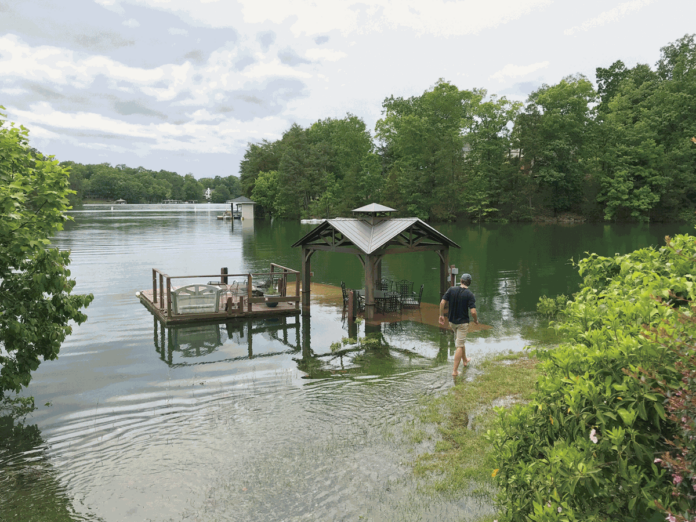Water sample results received on July 6 indicate the Lower Blackwater River now has acceptable levels of algae. The results were the second set of acceptable samples collected within the last 10 days, therefore the advisory from the Blackwater River from the confluence with Gills Creek to the confluence with the Roanoke River has been lifted. Normal recreational activities may resume in the area of the Lower Blackwater River.
The Upper Blackwater River arm of Smith Mountain Lake in Franklin County is continuing to experience a harmful algal bloom (HAB). Water sample results, collected on June 13, prompted the swimming advisory that remains in effect for the Upper Blackwater River above the confluence of Giles Creek due to unsafe levels of cyanobacteria, which have the potential to produce multiple toxins.
The advisory area where the public should continue to avoid swimming can be seen on an interactive Harmful Algal Bloom map. The most recent status report, containing the advisory area and sites where samples were collected, may be viewed at Smith Mountain Lake – Blackwater River HAB Status Report July 7, 2023.People and pets are advised to avoid swimming, windsurfing and stand-up-paddle-boarding, as well as other activities that pose a risk of ingesting water in this area.
Activities such as boating may continue with proper precaution throughout the lake. Additional follow-up samples indicating algae and toxins are below levels of concern are necessary to lift the remaining advisory – dates of next sampling are to be determined.
Algal blooms can occur when warm water and nutrients combine to make conditions favorable for algal growth. Most algal species are harmless. However, some species may produce irritating compounds or toxins. Avoid discolored water or scums that are green or bluish-green because they are more likely to contain toxins.
To prevent illness, people should:
- Avoid contact with any area of the lake where scums are present or water is green or blue-green or an advisory sign is posted,
WHEN IN DOUBT, STAY OUT!
- Not allow children or pets to drink from natural bodies of water.
- Keep children and pets out of the areas experiencing a harmful algal bloom and quickly wash them off with plenty of fresh, clean water after contact with algal scum or bloom water.
- Seek medical/veterinarian care if you or your animals experience symptoms after swimming in or near an algal bloom.
- Properly clean fish by removing skin and discarding all internal organs and cook fish to the proper temperature to ensure fish fillets are safe to eat.
- Contact the Harmful Algal Bloom Hotline at 1-888-238-6154 if you suspect you experienced health-related effects following exposure to a bloom.
- Visit SwimHealthyVA.com to learn more about harmful algal blooms or to report an algal bloom or fish kill.
The Virginia Department of Health (VDH) and the Virginia Harmful Algal Bloom Task Force, which includes VDH, Virginia Department of Environmental Quality, and Old Dominion University Phytoplankton Laboratory, will continue to monitor water quality in the lake. In general, advisories will be lifted following two consecutive test results (a minimum of 10-days apart) with acceptable levels for algal cell counts and/or toxin concentration. An advisory may be lifted or maintained at the discretion of the health department. For example, after one test an advisory may be lifted if results are within safe levels for swimming if other information indicates exposure or human health risk is low.

